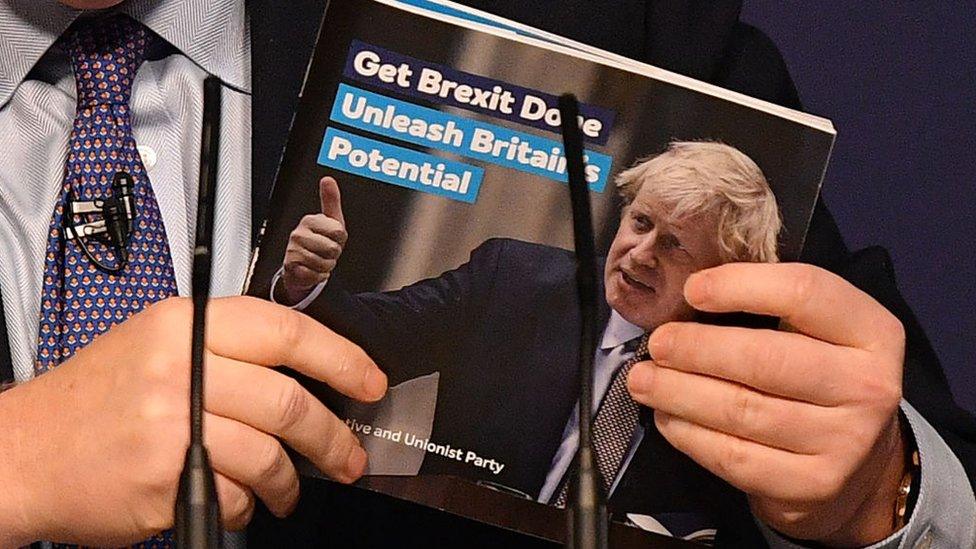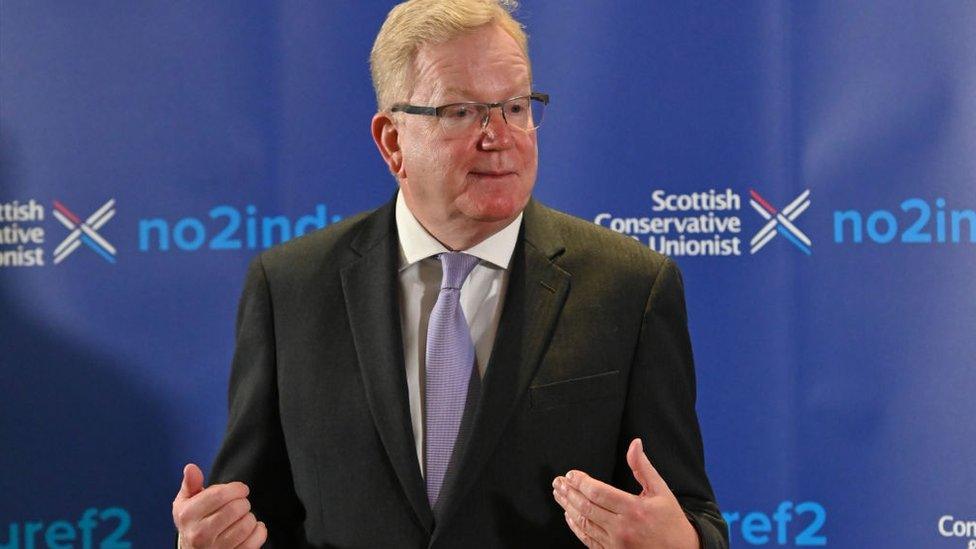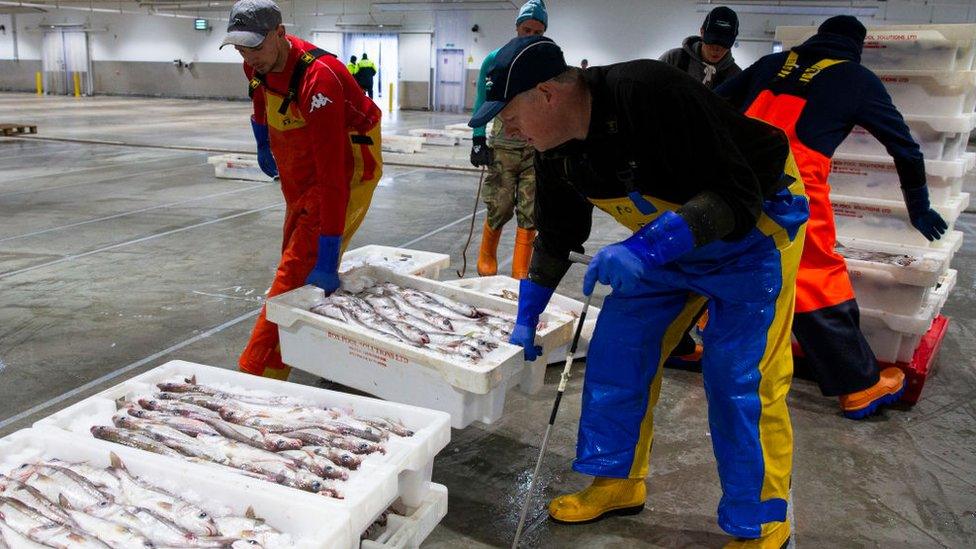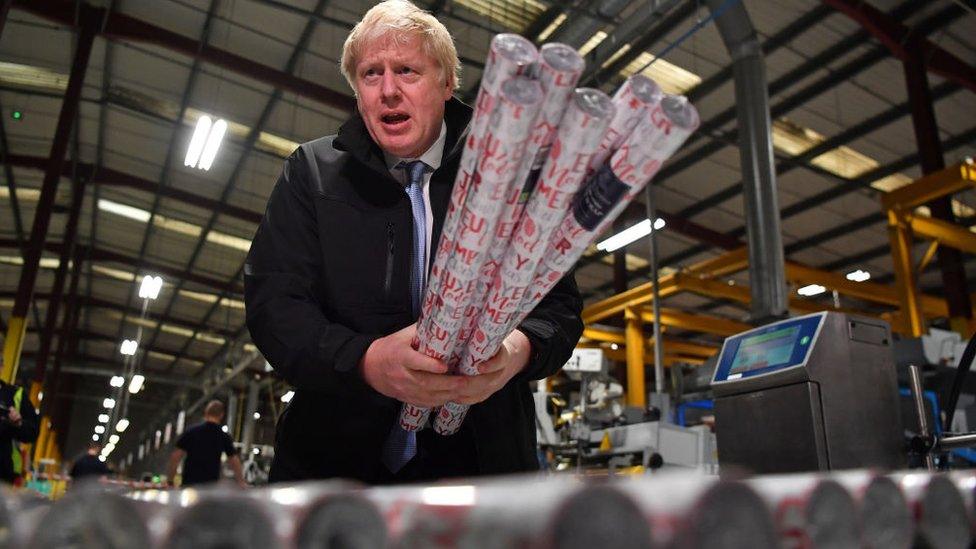Tories need to mind the manifesto gap
- Published

Conservatives leave a lot of gaps in their offer at this election, and a very different flavour in Scotland.
Fishing has been held up as a big beneficiary of Brexit, but its interests are more diverse than you might think.
Five years of Tory majority government would feature big debates about what kind of country the UK will become.
The words "Get Brexit Done" don't play much of a role in the Scottish Conservative manifesto.
Jackson Carlaw and his team identified the need to run a different campaign north of the border.
Without Ruth Davidson at the helm, they needed a clear message that wasn't about Boris Johnson or Brexit.
So, according to a senior Tory, who was only half joking: "The face of our campaign has been Nicola Sturgeon".
We'll soon find out how well it worked to entitle the Scottish Tory manifesto "No to Indyref2". (Outside the Twittersphere, are we sure that everyone knows what that means?)
Best prospects
But to round up my analysis of the party offerings at this election, here's a look at what's behind the cover and that slogan.
The Tory manifesto for England was noted for being rather thin. For a party that is both in government and with the best prospects of being there after 12 December, they chose to leave lots of options open.
Gone is the fetish with public spending control. The biggest constraint created was in promising not to raise the rates of income tax, VAT or National Insurance contributions.
That promise on income tax doesn't apply in Scotland. And the Scottish manifesto gave no indication of whether the 2021 Holyrood manifesto would take a distinctive path on cutting income tax.
My guess is that it will. But on the evidence in this election, the party also wants to be the party of fiscal responsibility and of public services.

Jackson Carlaw has concentrated on stopping indyref2
The attack on the SNP's stewardship of public services - which featured in the BBC Scotland Scottish leaders debate - comes with a flipside promise, that Tories aim to get the basics right.
There's not much to raise the electoral pulse rate in that. But much of it has to do with staffing shortages. So the manifesto seeks to align Tories with public sector workers, much more strongly than for many years.
This reflects one of the uncertainties around the election offer from Boris Johnson. With promises on higher public spending and better public services (whatever the exaggerated claims made for English hospitals), the Tory leader wants to position the party in the centre ground where government is a provider and more of a safety net than his Tory predecessors wanted it to be.
But if elected with his own mandate, will Mr Johnson be able to resist a rightward drift by his party? Centrists have been purged. The right has mobilised behind Brexit, and will want to continue pushing for a lower-tax, deregulated, small-state vision of the UK.
Deep freeze
If Boris Johnson is elected with a five-year term ahead, that is where much of the debate and tension would be. The Scottish Conservative Party will have to take its own position within that debate, defining the offer it puts to Scottish voters in May 2021.
As you might expect, much of the Tory pitch in England is to "get Brexit done" and to move on to public services. It is very light on detail about what has to happen next in the Brexit process.
So those who are bored with Brexit and think it will be placed in the deep freeze on 1 February, are in for a disappointment.
The following 11 months would likely be dominated by negotiations with the EU on the long-term relationship. And as Conservatives can't agree on that, European negotiators may, again, find themselves waiting for a clear position from Downing Street.
Parallel trade negotiations with the United States would start to throw up new dilemmas.
And closer to home, there are powers to be repatriated from Brussels. Whether they go to Westminster or Holyrood is already established as a constitutional battleground.
If Brexit goes ahead, there are new lessons to be learned in the art of compromise.
Take fisheries, for instance, which is seen as the Scottish industry that the party can champion in the Brexit process.

The Conservative manifesto repeats the mantra that the UK can leave the Common Fisheries Policy (CFP). But it doesn't say that the next range of offers involve different pressures and trade-offs. Consider this:
The white fish fleet, in north-east Scotland, dislikes the CFP, yet the boats left in it have now become more profitable, because it required the fleet to shrink.
Fish processors need access to European markets, where most of their output goes. They also rely on EU nationals to work in Scottish factories.
The creel fishers, with high-value lobsters and langoustines, require access to European markets, but fear that post-Brexit trade could land them with more bureaucracy, higher cost, potential tariffs (as paid by Norway) and delayed journeys of fresh produce at English ports.
Salmon farmers also fear losing access to EU markets, with the imposition of tariffs. They are mostly Norwegian-owned, and Norway has to pay a tariff to send processed fish into EU shops and restaurants.
European Commission negotiators, and member governments, have made special mention of the importance to them of retaining access to UK waters by EU boats after Brexit. There has to be every expectation that they will link continued access to UK waters to continued access for British fish exporters to EU markets.
In short, the Brexit offer on fishing has been oversold. It is not only that fishing represents a tiny part of the UK economy, and other sectors may be given a higher priority in the trade-offs of trade negotiations. It is also that the fishing industry itself has more of an interest in continuing the current trading system than in monopolising access to UK waters.
Fishing is one of those sectors which show the importance to the Scottish Tory campaign of the north-east of Scotland. Because of that regional emphasis, there is a proposed review of whisky duty ("reviews" are a long way short of a promise of change) and greater flexibility than before on allowing EU agricultural workers into the country.
Meanwhile, in looking ahead to other battlegrounds that can be expected if Tories win a majority to govern for the next five years, the manifesto opens up the possibility of a root and branch review of the British constitution.

Boris Johnson has chosen to leave his options open when it comes to handing out spending "gifts"
The following sentence is an important one: "After Brexit, we need to look at the broader aspects of our constitution: the relationship between the UK Government, UK Parliament and the courts: the functioning of the Royal Prerogative: the role of the House of Lords: and access to justice for order in art people."
It used to be, under Theresa May and others, that Conservatives were keen to pull the UK out of the European Convention on Human Rights (different and separate from the European Union). That now looks like "an update" of the Human Rights Act.
Again, this debate raises the question of which Boris Johnson would be in charge over five years; either the liberally-minded London mayor version, or the one leading a government with a battle-hardened approach to the courts' involvement in Brexit and its thwarting by Parliament.
Power shift
Almost anyone could sign up to a review of the constitution after the past few years when it has shown its unfitness for purpose. But is that what Conservatives would do?
Would they, instead, see an opportunity to shift power from Parliament and from courts towards government and towards Downing Street? We don't know.
A Constitution, Democracy and Rights Commission is promised. Assume devolution and Scotland would be part of that mix.
But who leads and drives it, its remit and its deliberations would surely be vital to defining the type of country the UK would become after Brexit.
Would the Conservatives be conservative or revolutionaries, taking a wrecking ball to the constitution? And what could anyone else do to stop them?
